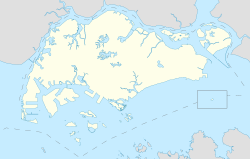| Waterboat House Garden | |
|---|---|
| Former Merlion Park | |
 Former Merlion Park, currently Waterboat House Garden | |
| Type | historical park |
| Location | Singapore |
| Coordinates | 1°17′14.3″N103°51′12.2″E / 1.287306°N 103.853389°E |
| Area | 0.738 hectares (7,380 sqm) |
| Opened | 15 September 1972 |
| Status | Open |
Waterboat House Garden is a small park located near the mouth of the Singapore River, near the Central Business District (CBD) in Singapore. The park was once the original site of the former Merlion Park where the two iconic statues of the Merlion and its miniature form were originally located.


